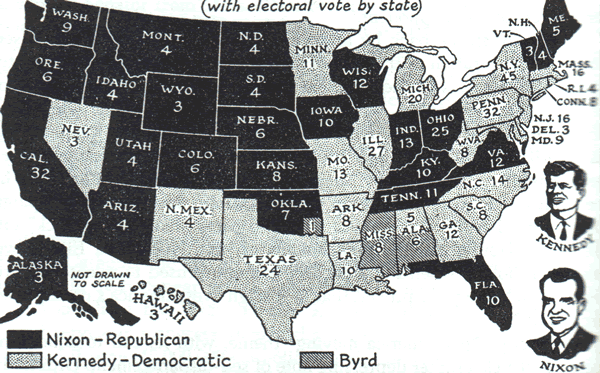Elections: 2008 and 1960
June 29, 2007
by William P. Meyers
Popular Articles:
| Movie Reviews |
| U.S. War Against Asia |
| Fascism |
| The Vatican Rag |
| And the War Goes On |
| Corruption in the USA |
| Irradiated Food |
| Democratic Party |
| Republican Party |
| Anarchism |
There are a lot of candidates in the field hoping to be elected President of the United States of America in 2008, or at least to feed on campaign contibution and media attention in the mean time. No one stands out and there are many wild cards both within the "major" parties and outside. Michael Bloomberg, billionaire mayor of New York may run. I hear the Green Party may have a very attractive, non-Nader candidate. If former New York mayor Rudolph Giuliani is the Republican nominee there will almost certainly be an independent, ultra-right candidate. And never underestimate the Libertarian Party.
Those who fail to study history are doomed to repeat it, just like those of us who do study history. I have been rethinking basic interpretations provided by the corporate media and academic thinkers (who are seldom as far apart as they like to pretend) and want to share some thoughts on the 1960 elections.
Usually 1960 is cast as the victory of a liberal Democrat, John F. Kennedy, over a conservative Republican, Richard Nixon. But a lot of actual facts don't fit that neat picture. Just for instance Nixon was a Quaker, a group often associated with radical left politics, and Kennedy was a Catholic, usually a group associated with conservative to fascist politics (with many exceptions, notably Catholic Worker and Liberation Theology).
Here is a map of who won the 1960 electoral college votes, state by state:

What is that strange Byrd thing? Why, it is the 15 electoral college votes that went to Harry Byrd, who was not even a candidate. Certain unpledged electors could stomach neither the Republican Nixon nor the Catholic Kennedy, so they gave their votes to Byrd. Kennedy ended up with 303 electoral votes to 219 for Niixon, so even if Nixon really won Illinois, as is widely alleged, Kennedy would still have won the election.
The key thing to see in this map, that most people have been taught not to see, is that Kennedy was the candidate that white racists voted for. It was not just a marriage of convenience. President Eisenhower, pushed by Vice-President Nixon, had been implementing the Supreme Court decision to desegregate schools in the South. Kennedy, as a Democrat, was part of a long standing agreement to support segregation to get votes in the South.
John F. Kennedy was an astute student of rhetoric, but a bad President (unless you are a racist, nationalist, and militarist). He did less than Eisenhower and Nixon about civil rights: he had to if he wanted the Southern electoral college votes again in 1964. He was a war criminal who okayed the invasion of Cuba; the fact that the invasion was repulsed by the people of Cuba hardly lessens his guilt. He was the son of a rapacious capitalist; he had been a supporter of the Red Scare when it was politic; he said Eisenhower was not tough enough on Communism. His only lasting legacy was the space program, which was mainly about regaining military supremacy over the Soviet Union while putting the expenses outside the military budget.
The truly sad thing is that Nixon turned to the dark side between his defeat in 1960 and his election in 1968. He inherited a war with Vietnam from Johnson. (Before Lyndon Johnson, American troops in Vietnam were primarilly for advising and training the South Vietnamese army that was going to defeat the commie terrorists. Every American President since James Buchanan in 1856 has inherited the War Against Asia, however.) He became a war criminal by invading Cambodia and Laos as well as by continuing attacks on civilians.
I think the ultimate solution to fixing American politics would include returning the President to the position intended by the Constitution: an administrator who carries out policies made by Congress. But that won't be one of the choices in 2008. Ladies and gentlement, if you have money place your bets; if you don't, you are still allowed to vote in the primaries and general election.
